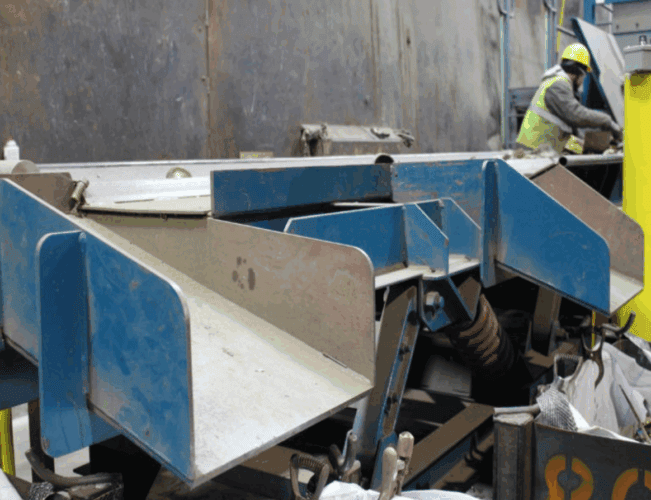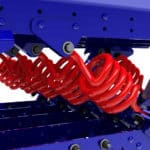Why Recycling Technology Matters Now More Than Ever
The global demand for metals is on the rise, with industries like automotive, electronics, and construction driving the need for more raw materials. However, the availability of these metals is finite, and the environmental costs associated with traditional mining are steep. This presents a critical challenge for manufacturers who must balance the need for metal with sustainability goals.
Enter metal recycling technology—an essential solution to this growing issue. With new technologies in place, the recycling industry is now more capable than ever of efficiently processing materials, recovering valuable metals, and reducing the strain on our natural resources. These advancements are making metal recycling not only a viable alternative to mining but a key component of a sustainable circular economy.
At General Kinematics, we are proud to lead the way in manufacturing the next-generation recycling systems that play a crucial role in this transformation. Our equipment and technologies help close the loop on the metal lifecycle, ensuring that metals are reused, repurposed, and returned to the production process.
Understanding the Modern Metal Recycling Workflow
1. Smarter Collection and Material Identification
The first step in an effective metal recycling process is to collect and identify the right materials. Sorting has become faster, more accurate, and more efficient due to advancements in sorting system technology. General Kinematics specializes in equipment that streamlines the separation and processing of materials, ensuring optimal recovery.
For example, General Kinematics’ DE-STONER® sorts materials based on weight to ensure maximum classification efficiency. It effectively removes unwanted light materials, such as plastic, from recovered scrap metal. Once the metals have been separated from other materials, they are further sorted by type. Workers use conveyors to organize metals such as copper, steel, and aluminum, ensuring high-quality metals move forward in the process.
Ferrous and non-ferrous metals are also separated using specialized methods. Some facilities employ crossbelt magnetic separators to efficiently separate ferrous metals from non-ferrous ones, ensuring purity and optimal recovery.
2. Shredding, Processing, and Purification
Once metals are sorted, the next phase is shredding and processing. Advanced shredders and separators break down large metal pieces into smaller, more manageable sizes, facilitating easier handling and recovery of valuable materials. The FINGER-SCREEN™ for Metal Recovery from General Kinematics is an example of a solution that uses high-frequency vibrating screens to separate fine materials from larger ones, ensuring maximum recovery of metals and enhancing overall process efficiency.
Purification also plays a critical role, ensuring that recycled metals meet industry standards. With General Kinematics’ vibrating equipment and separators, facilities can achieve consistent material purity, making it easier to recycle metals that meet the stringent requirements of industries such as aerospace, automotive, and construction.
3. Output Verification and Quality Control
After metals are processed and purified, output verification is necessary to ensure the materials meet quality standards. Metal recycling technology, such as X-ray Fluorescence (XRF) analysis and inline metal composition testing, offer precise and detailed information on the metal’s purity. While these tools are not part of General Kinematics’ core offering, integrating them into your facility can complement the performance of GK equipment, helping to guarantee that recycled materials meet compliance and performance standards.
By investing in these additional verification tools, manufacturers can ensure the integrity of their materials, improve product performance, and reduce waste. This combination of General Kinematics’ advanced equipment and supplementary technologies ensures that businesses stay competitive while meeting customer demands for high-quality recycled metals.
Environmental and Business Benefits That Can’t Be Ignored
Reduced Energy Use
Recycling metal consumes up to 95% less energy than mining and refining raw metal. This reduction not only lowers operational costs but also promotes a more sustainable environment.
Lower Greenhouse Gas Emissions
Modern recycling processes use fewer resources and generate much lower emissions compared to traditional methods, helping businesses meet sustainability goals and regulatory standards.
Cost Savings and ROI
Investing in advanced recycling technologies leads to cost savings through reduced waste, faster processing, and fewer breakdowns. These improvements result in better throughput and lower operational costs, offsetting the initial investment.
Circular Economy Impact
Smarter recycling technologies support a circular economy by reusing and repurposing materials, reducing the need for raw materials and minimizing environmental impact.
Key Challenges to Widespread Adoption
System Compatibility Issues
Integrating new technologies with older equipment can be complex and costly. However, the long-term benefits, including improved efficiency and reduced operational costs, often outweigh the initial investment. Manufacturers should work with experts to ensure smooth integration and maximize the value of existing systems while adopting modern metal recycling technology.
Skilled Labor Gaps
As recycling technology becomes more automated, there’s a growing need for skilled workers to operate advanced machinery. Cross-training employees to manage both traditional and modern systems is essential for maximizing the value of new technologies and maintaining efficiency.
Capital Investment Requirements
While modernizing recycling systems requires significant upfront costs, the return on investment is substantial. New technologies lead to better recovery, faster processing, and reduced energy costs, contributing to long-term savings. Government incentives can also help offset these costs and accelerate adoption.
Investing in Smarter Systems for Smarter Recycling
Innovation plays a critical role in scaling efficient and eco-friendly metal recycling. With the rapid advancements in technology, metal recycling processes are becoming faster, cleaner, and more cost-effective. The adoption of these technologies not only helps businesses meet the growing demand for metals but also ensures that industries contribute to a sustainable future.
At General Kinematics, we’re proud to be a leader in the development of recycling systems that drive the circular economy. Our advanced equipment helps manufacturers recover more valuable materials while reducing their environmental impact. By investing in smarter, more efficient recycling systems, manufacturers can reduce costs, improve productivity, and contribute to a greener world.
For businesses looking to stay ahead in this evolving industry, the time to invest in next-generation scrap metal processing and recycling technologies is now. General Kinematics is here to help you build up your metal recycling operations and take the next step toward sustainability.
Explore our Recycling Equipment and Machinery






